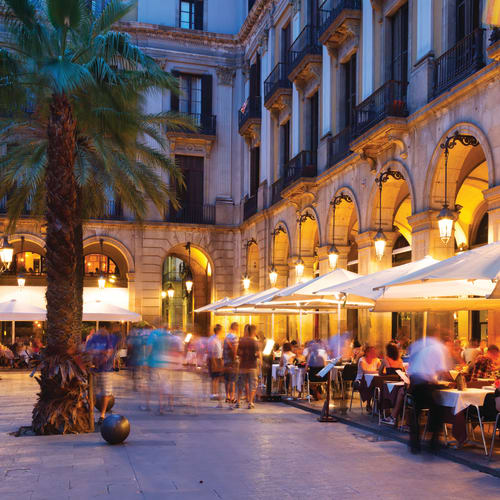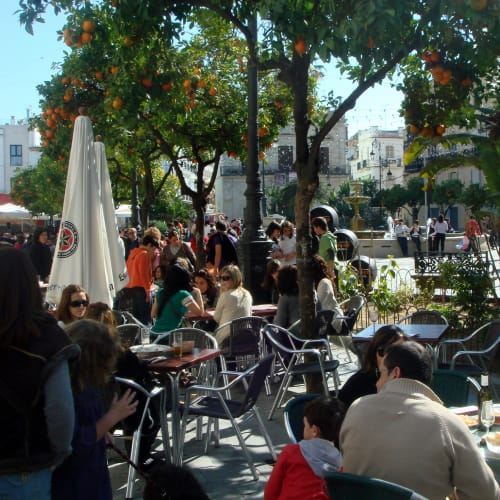The Bond of Hospitality - Eating Together is Central to Our Human Identity
November 2009




I met my first Spaniard almost 45 years ago at about 2 in the morning. He was a young bartender at Casa Angel, a tiny café in Valencia, and I was a young naval officer who had just walked off my destroyer to explore the gothic quarter of town by myself. He welcomed me as if I were an old friend, and while we were awkwardly talking to each other in two languages, he prepared for me a cazuela of gambas al ajillo, garlic shrimp sizzling in olive oil. When I told him how much I enjoyed it, he wrote out his special recipe and gave it me saying, "Why don’t you call it "Gambas Angel?"
Since that time, I have found that a distinguishing characteristic of the Spanish culture is this kind of spontaneous generosity. Hospitality is extended to all: whether you are a visitor or one of their extended family. It seems second nature for the Spaniard to want to spend time with you around a table spread with freshly prepared food. The Spaniard seems to know instinctively that eating together is central to our identity as fellow humans.

I remember sitting with my son Tim in Sanlúcar de Barrameda at an outdoor café where we were contemplating a dinner of shrimp and langostinos. The seafood was quite expensive, but that did not faze the young working class family beside us. They were having a great time laughing together as they feasted on a large platter of the freshest shellfish available. I was at first quite surprised, but then it occurred to me that they had their priorities right.
I can hardly recall a time in Spain visiting those who provide products for La Tienda, that we did not seamlessly migrate to the dinner table. There we could forge bonds which transcended business, enjoying each other’s company and the conversation about our families and the delicious meal before us.
In a couple of weeks we Americans will gather around dinner tables across the land to celebrate Thanksgiving Day. Although on one level it is akin to harvest festivals all over Europe, our Thanksgiving Day is a civic holiday unique to our nation. This American gathering, which stretches across the continent, reflects a new kind of society where people give thanks in a land of plenty, focusing on what is really important: their bonds as human beings.
Tradition says that in 1620 (or is it 1607?) after enduring difficult circumstances to become established in their New World, English settlers gathered with their native neighbors, to give thanks to their Creator for their survival. Those who braved the Atlantic storms to settle in Cape Cod were seeking to worship in freedom. The Virginia settlers in Jamestown, on the other hand were supported by the English crown and worshiped according to the Anglican tradition. What was unique is that these settlers celebrated their providential survival by sitting down at a table with their neighbors: earlier Americans native to the soil, whom they thought of as Indians. In these idealized accounts you see the seeds of America’s disparate backgrounds gathering within their common traditions of hospitality.
I remember back to my childhood when the Harris family would gather each Thanksgiving Day in Brookline, Massachusetts. My grandparents met as teenagers on the ship that was taking them from their homes in Northern Ireland. Through legendary Scottish frugality and just plain hard work, William and Ann raised a family of eight children – 4 boys and 4 girls. In time they in turn raised their own families so that by the time that I came along our Thanksgiving gathered a clan of between forty and fifty. What fun! We would have the obligatory touch-football game with the uncles and cousins in the crisp autumn air, and on one memorable occasion my Aunt Marion brought along a cute little kid (four legged type) who proceeded to leap onto the middle of the dining room table! For the Harris family there was much to be thankful for and the gathering reinforced our bonds to one another as kin.
As many of you well know, this kind of gathering is not just a special once a year occasion in Spain, or in other Mediterranean cultures. Throughout the year the extended family meets together. From infants to pensioners they enjoy each other’s company by the hour. It is in this affirming environment that children feel both treasured and nurtured.
Unfortunately, in America these days not many people have large families living within a few miles. As the American culture has evolved, even our immediate families may be scattered across the continent and beyond. My wife Ruth has a sister and brother in Vermont and another sister in Guam. In contrast, my brother and cousins still live largely in Massachusetts, but we no longer gather as an extended family.
Still, we Americans think that the Thanksgiving gathering is so important, that despite the fact that our families are strewn across the continent, we want to be together. Each year our airports experience their peak volume of travelers at Thanksgiving – even more than at Christmastime. And our telephone lines are jammed with calls as we renew our bonds with family and friends.
The roots of this elemental occurrence reach beyond family feasts in America or the long dinners in Spain. Perhaps it is because cooking for others, unlike daily chores such as mowing the lawn or cleaning the house, is something that strikes a deep emotional chord in us. I read an excellent article in the August 2, 2009, issue of the NY Times Magazine that suggested that eating a meal together might even go to the heart of our identity as human beings. When taken seriously as a human activity, sharing a meal which we have prepared is very important to our happiness and to our health.

According to the author, Michael Pollan, cooking made us who we are. It is a symbolic way of distinguishing ourselves from the animals. He says that cooking is a metaphor for the human transformation of nature into culture; anthropologists have begun to take quite literally the idea that cooking is the key to our humanity. For our early ancestors, it was the discovery of fire and then cooking and eating together — not just tool-making or language – that made us human. In the Paleolithic art in the caves of Altamira we see our earliest ancestors depicting their hunt for game.
If we let ourselves be governed by the Food Police we miss the sacredness of the occasion. How many a dinner is drained of joy by discussions of calories and fiber, or the mercury content of the beautifully prepared fish before you! Breaking bread together gives us not just the physical nourishment but also the occasion of being together at an appointed time and place.
I think we all know that when we set aside a regular time to eat together with our children, looking at their faces and hearing their stories, having a meal becomes not just a way to assuage our hunger but an occasion to build bonds of caring and love. We miss something important when we choose to skip meals altogether or graze at convenience stores where our only contact with others is waiting in line with our paper cups of coffee.
I hope that this Thanksgiving Day you will find that being together with those with whom you bond is restorative and nourishing. Even if you are not a confident chef, I hope you just take the plunge and cook away. That’s what Julia Child did. Being in the kitchen together is fun, which is why so many of us instinctively gather there. Don’t be intimidated by some complex recipe, and certainly tell the Food Police they are not welcome at your hearth – at least for today. I hope you can take pleasure in what the Creator has laid before you, and perhaps extend hospitality to those beyond the family. That’s what the Pilgrims did, and that is what America is all about.
Tu amigo,
Don

